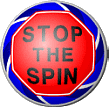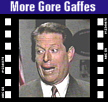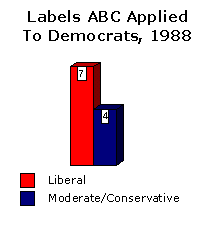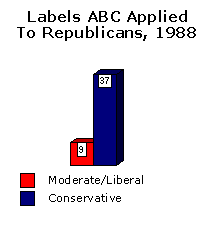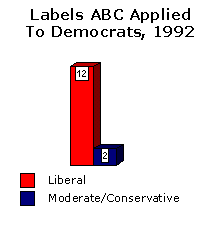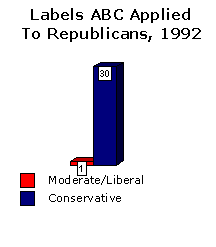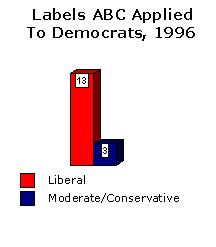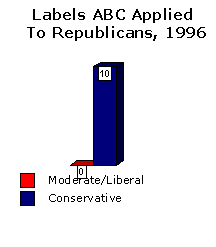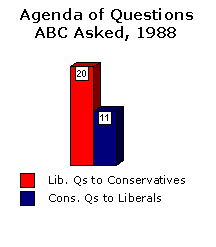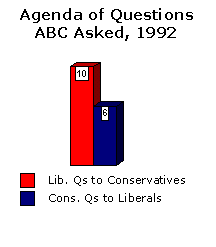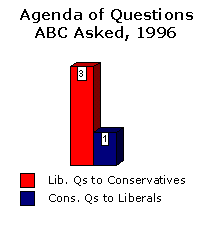|
|||||||||||||||||||||||||||||||||
|
|
|||||||
 |
||||||||||||||||||||||||
|
||||||||||||||||||||||||
 |
||||||
|
||||||
 |
||||||||||||||||||
|
||||||||||||||||||
 |
||||||||||||
|
 |
||||||||||||||||||||||||
|
||||||||||||||||||||||||
 |
|||||||||||||||
|
|||||||||||||||
|
ABC News Labeling and Questions At Republican and Democratic National Conventions, 1988-1996 Use of Labeling George Washington University Professor William C. Adams conducted the first exhaustive examination of the networks’ prime time convention coverage in 1984. The findings? Unequal treatment of the Democratic and Republican National Conventions by network anchors and correspondents. In his landmark study, Prof. Adams found that correspondents cast Republicans as ideologues by frequently labeling them "conservative" or "right-wing" while almost never labeling Democrats as "liberal" or "left-wing." Since 1988, analysts at the Media Research Center have applied Prof. Adams’s methodology to broadcast and cable convention coverage, including ABC News coverage. The numbers below demonstrate that in convention coverage, since 1988 ABC News has failed to apply ideological labels in a fair and balanced manner. Overall (1988-1996), ABC News was more than twice as likely to apply ideological labels to conservatives as liberals, with the total being ABC's use of seventy-seven "conservative" labels compared to only thirty-two "liberal" labels. (Read the quotes.)
Agenda of Questions Balanced reporting requires that correspondents periodically don Devil’s advocate hats. One of the most efficient ways of doing this is to pose challenging questions to interviewees — conservative/Republican-agenda questions to Democrats, and liberal/Democratic-agenda questions to Republicans. The numbers below show that ABC News’s performance in this area is shockingly poor. In fact, over the past three conventions, combined data show ABC News anchors and correspondents posed twice as many of these challenging questions to Republicans as they did to Democrats. The totals: ABC News asked thirty-three liberal/Democratic-agenda questions of Republicans, compared to only eighteen conservative/Republican-agenda questions of Democrats. (Read the quotes.)
ABC's Use of Labels: The Numbers
ABC's Use of Labels: The Quotes Labeling Delegates Jeff Greenfield, after acknowledging the obvious, uses labels to assure viewers they needn’t worry that Democratic delegates are very liberal: "What’s interesting to me, Peter, is the delegates who clearly are way to the left even of rank and file Democrats, much less the country, have signed on to a moderate centrist platform." (Broadcasting from Democratic National Convention, 8/26/96) Peter Jennings asks about certain Republican delegates as if they were biological oddities to be carefully studied: "Michel McQueen on the floor, do tell us, Michel, about the conservative Christians who make up a very large part of this convention. What’s the challenge there?" (Broadcasting from Republican National Convention, 8/22/96) Labeling Platforms David Brinkley told viewers the 1992 Democratic platform was "not right wing, but...a good deal further right" than Democrats traditionally adopt. (Broadcasting from Democratic National Convention, 1992) Peter Jennings asserts the 1996 Republican convention "...has been colored by the party’s most conservative elements." (Broadcasting from Republican National Convention, 1992) Labeling Parties Peter Jennings mulls over the Republican party in this prelude to an exchange: "...thinking a little bit more about this business of a conservative evening...you know the conservatives as well as anybody...." (Broadcasting from Republican National Convention, 1992) Peter Jennings announces that the Clinton-Gore ticket is trying to move the Democratic party to "the center." (Broadcasting from Democratic National Convention, 1992) Labeling Candidates Jim Wooten uses ideological labels to set up a Republican straw man: "Bob Dole and Jack Kemp have to identify themselves tonight and they have to choose whether they’re going to be the ticket of the Ralph Reed, religious right, Christian Coalition Republicans or whether they’re going to be the ticket of the more inclusive party we’ve seen from the podium this week." (Broadcasting from Republican National Convention, 8/15/96) Cokie Roberts gives short shrift to substantive issues of concern to Democratic voters by resorting to the use of the label "moderate": "What the delegates there [Texas, Oklahoma, Virginia delegations] and the politicians there have been telling me tonight is this convention has got to look very moderate for their Democrats to win in those states...." (Broadcasting from Democratic National Convention, 8/26/96)
Liberal/Democratic-Agenda Questions to Republicans Lynn Sherr has to interview an alternate delegate from liberal California to bring up the abortion issue: "Peter, one of the deepest divisions in the Party this year has been the issue of abortion. I’m here with Kate Nyegaard, she’s an alternate delegate from California, a lifelong Republican. But Mrs. Nyegaard, you’re telling me that it is possible you may not vote for George Bush because of his position on abortion...?" (8/17/92) Peter Jennings asks William Bennett to explain how a speech can be good and reflect the Judeo-Christian view of homosexuality: "You said that Pat Buchanan gave a very good speech last night. How did you feel about all those negative references to gays and lesbians?...How good is it for the party?" (8/18/92) Jim Wooten expresses incredulity that Michigan Republican delegate Bob Anderson might believe Congress would be better if Republican-controlled: Liberal/Democratic-Agenda Questions to Democrats, Too Cokie Roberts pushes the notion that the Democratic party is not strongly pro-union in a question to the Teamster boss: "I’m talking to Frank Gallegos from California who is a Teamster official, a union man. Bill Clinton has not been terribly sympathetic to the unions. Are you going to be, is it going to be comfortable for you to be working for him?" (7/15/92) Jeff Greenfield furthers the popular idea that President Clinton is not a liberal in this question to U.S. Representative Charles Rangel: "Charles Rangel of New York will be the Chairman of the House Ways and Means Committee should the Democrats retake the Congress. Congressman, it used to be said that when the Democrats make a firing squad they form a circle, they love to rebel against an incumbent President, and you have the welfare bill and the move to the center. You’re from one of the most liberal cities in the country, why is the dog not barking in the night? Why are you staying with the President given that discontent?" (8/26/96) Michel McQueen weaves another version of the Democratic-party-is-not-liberal theme into a question to Lynn Cutler: "I’m here with Lynn Cutler, whom many people who follow in politics probably remember as former vice chairman of the Democratic Committee from Iowa. She told me earlier when I was asking about concerns the President has abandoned the liberal wing of the party that she is comparing her candidate not to perfection but to Bob Dole. Isn’t that right, Lynn, do the liberals in the party as you unashamedly describe yourself feel abandoned by the President this year?" (8/26/96)
Convention Coverage
(by Network): Back to Campaign 2000 Home Page
Home | News Division
| Bozell Columns | CyberAlerts |
||||||||||


